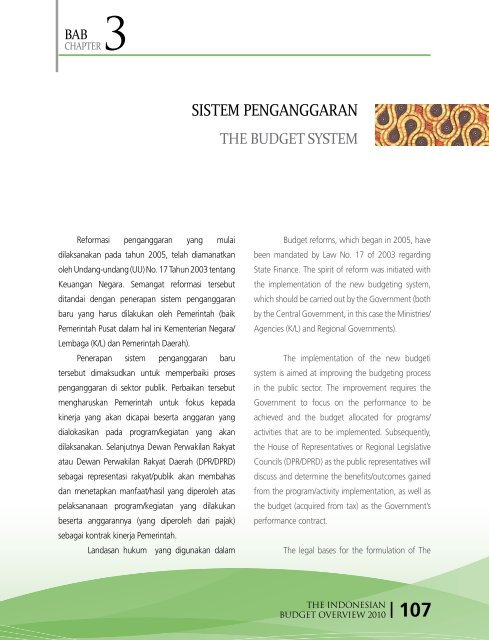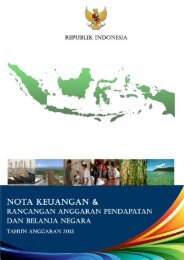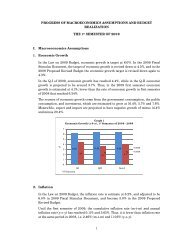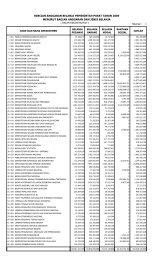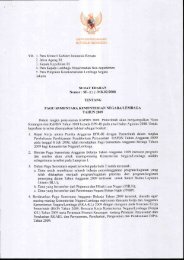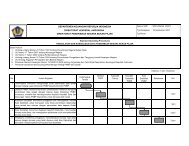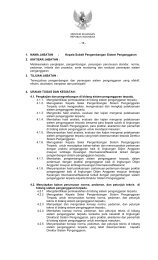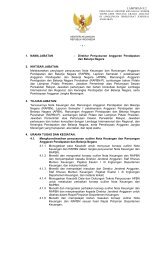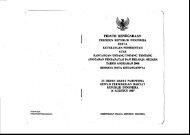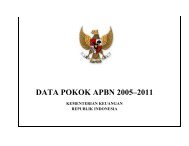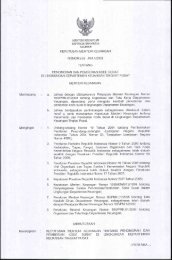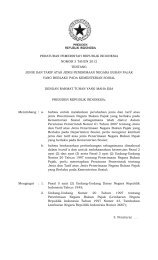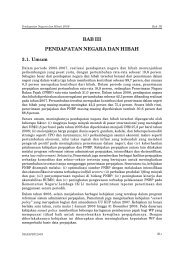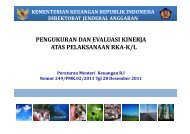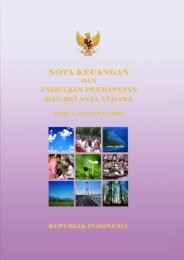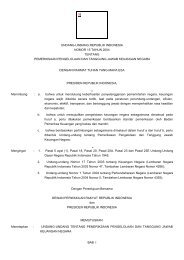- Page 6 and 7:
6. Dampak Krisis Yunani TerhadAp AP
- Page 9 and 10:
SAMBUTANDIREKTUR JENDERAL ANGGARANR
- Page 11 and 12:
SAMBUTAN DIREKTUR JENDERAL ANGGARAN
- Page 13:
RINGKASAN EKSEKUTIFEXECUTIVE SUMMAR
- Page 17 and 18:
RINGKASAN EKSEKUTIF | EXECUTIVE SUM
- Page 19 and 20:
RINGKASAN EKSEKUTIF | EXECUTIVE SUM
- Page 23 and 24:
BABCAPTER1RENCANA PEMBANGUNAN JANGK
- Page 25 and 26:
RENCANA PEMBANGUNAN JANGKA MENENGAH
- Page 27 and 28:
RENCANA PEMBANGUNAN JANGKA MENENGAH
- Page 29 and 30:
RENCANA PEMBANGUNAN JANGKA MENENGAH
- Page 31 and 32:
RENCANA PEMBANGUNAN JANGKA MENENGAH
- Page 33 and 34:
RENCANA PEMBANGUNAN JANGKA MENENGAH
- Page 35 and 36:
RENCANA PEMBANGUNAN JANGKA MENENGAH
- Page 37 and 38:
RENCANA PEMBANGUNAN JANGKA MENENGAH
- Page 39 and 40:
RENCANA PEMBANGUNAN JANGKA MENENGAH
- Page 41 and 42:
RENCANA PEMBANGUNAN JANGKA MENENGAH
- Page 43:
RENCANA PEMBANGUNAN JANGKA MENENGAH
- Page 46 and 47:
RENCANA PEMBANGUNAN JANGKA MENENGAH
- Page 48 and 49:
RENCANA PEMBANGUNAN JANGKA MENENGAH
- Page 50 and 51:
RENCANA PEMBANGUNAN JANGKA MENENGAH
- Page 52:
RENCANA PEMBANGUNAN JANGKA MENENGAH
- Page 56 and 57: ANGGARAN PENDAPATAN DAN BELANJA NEG
- Page 58 and 59: ANGGARAN PENDAPATAN DAN BELANJA NEG
- Page 60 and 61: ANGGARAN PENDAPATAN DAN BELANJA NEG
- Page 62 and 63: ANGGARAN PENDAPATAN DAN BELANJA NEG
- Page 64 and 65: ANGGARAN PENDAPATAN DAN BELANJA NEG
- Page 66 and 67: ANGGARAN PENDAPATAN DAN BELANJA NEG
- Page 68 and 69: ANGGARAN PENDAPATAN DAN BELANJA NEG
- Page 70 and 71: ANGGARAN PENDAPATAN DAN BELANJA NEG
- Page 72 and 73: ANGGARAN PENDAPATAN DAN BELANJA NEG
- Page 74 and 75: ANGGARAN PENDAPATAN DAN BELANJA NEG
- Page 76 and 77: ANGGARAN PENDAPATAN DAN BELANJA NEG
- Page 78 and 79: ANGGARAN PENDAPATAN DAN BELANJA NEG
- Page 80 and 81: ANGGARAN PENDAPATAN DAN BELANJA NEG
- Page 82 and 83: ANGGARAN PENDAPATAN DAN BELANJA NEG
- Page 84 and 85: ANGGARAN PENDAPATAN DAN BELANJA NEG
- Page 86 and 87: ANGGARAN PENDAPATAN DAN BELANJA NEG
- Page 88 and 89: ANGGARAN PENDAPATAN DAN BELANJA NEG
- Page 90 and 91: ANGGARAN PENDAPATAN DAN BELANJA NEG
- Page 92 and 93: ANGGARAN PENDAPATAN DAN BELANJA NEG
- Page 94 and 95: ANGGARAN PENDAPATAN DAN BELANJA NEG
- Page 96 and 97: ANGGARAN PENDAPATAN DAN BELANJA NEG
- Page 98 and 99: ANGGARAN PENDAPATAN DAN BELANJA NEG
- Page 100 and 101: ANGGARAN PENDAPATAN DAN BELANJA NEG
- Page 102 and 103: ANGGARAN PENDAPATAN DAN BELANJA NEG
- Page 104: ANGGARAN PENDAPATAN DAN BELANJA NEG
- Page 109 and 110: SISTEM PENGANGGARAN | THE BUDGETING
- Page 111 and 112: SISTEM PENGANGGARAN | THE BUDGETING
- Page 113 and 114: SISTEM PENGANGGARAN | THE BUDGETING
- Page 115 and 116: SISTEM PENGANGGARAN | THE BUDGETING
- Page 117 and 118: SISTEM PENGANGGARAN | THE BUDGETING
- Page 119 and 120: SISTEM PENGANGGARAN | THE BUDGETING
- Page 121 and 122: SISTEM PENGANGGARAN | THE BUDGETING
- Page 123 and 124: SISTEM PENGANGGARAN | THE BUDGETING
- Page 125 and 126: SISTEM PENGANGGARAN | THE BUDGETING
- Page 127 and 128: SISTEM PENGANGGARAN | THE BUDGETING
- Page 129 and 130: SISTEM PENGANGGARAN | THE BUDGETING
- Page 131 and 132: SISTEM PENGANGGARAN | THE BUDGETING
- Page 133 and 134: SISTEM PENGANGGARAN | THE BUDGETING
- Page 137 and 138: KEBIJAKAN PEMBATASAN SUBSIDIBAHAN B
- Page 139 and 140: KEBIJAKAN PEMBATASAN SUBSIDI BAHAN
- Page 141 and 142: KEBIJAKAN PEMBATASAN SUBSIDI BAHAN
- Page 143 and 144: KEBIJAKAN PEMBATASAN SUBSIDI BAHAN
- Page 145 and 146: KEBIJAKAN PEMBATASAN SUBSIDI BAHAN
- Page 147 and 148: KEBIJAKAN PEMBATASAN SUBSIDI BAHAN
- Page 149 and 150: KEBIJAKAN PEMBATASAN SUBSIDI BAHAN
- Page 151 and 152: KEBIJAKAN PEMBATASAN SUBSIDI BAHAN
- Page 153 and 154: KEBIJAKAN PEMBATASAN SUBSIDI BAHAN
- Page 155 and 156:
PENERAPAN REWARD DAN PUNISHMENTSTIM
- Page 157 and 158:
PENERAPAN REWARD DAN PUNISHMENT STI
- Page 159 and 160:
PENERAPAN REWARD DAN PUNISHMENT STI
- Page 161 and 162:
PENERAPAN REWARD DAN PUNISHMENT STI
- Page 163 and 164:
PENERAPAN REWARD DAN PUNISHMENT STI
- Page 165 and 166:
PENERAPAN REWARD DAN PUNISHMENT STI
- Page 167 and 168:
PENERAPAN REWARD DAN PUNISHMENT STI
- Page 169 and 170:
PENERAPAN REWARD DAN PUNISHMENT STI
- Page 171 and 172:
PENERAPAN REWARD DAN PUNISHMENT STI
- Page 173 and 174:
PENERAPAN REWARD DAN PUNISHMENT STI
- Page 175 and 176:
PENGALIHAN PAJAK BUMI DAN BANGUNAND
- Page 177 and 178:
PENGALIHAN PAJAK BUMI DAN BANGUNAN
- Page 179 and 180:
PENGALIHAN PAJAK BUMI DAN BANGUNAN
- Page 181 and 182:
PENGALIHAN PAJAK BUMI DAN BANGUNAN
- Page 183 and 184:
PENGALIHAN PAJAK BUMI DAN BANGUNAN
- Page 185 and 186:
PENGALIHAN PAJAK BUMI DAN BANGUNAN
- Page 187 and 188:
PERANAN REKENING MIGAS DALAMOPTIMAL
- Page 189 and 190:
PERANAN REKENING MIGAS DALAM OPTIMA
- Page 191 and 192:
PERANAN REKENING MIGAS DALAM OPTIMA
- Page 193 and 194:
PERANAN REKENING MIGAS DALAM OPTIMA
- Page 195 and 196:
FASILITAS LIKUIDITAS PEMBIAYAAN PER
- Page 197 and 198:
FASILITAS LIKUIDITAS PEMBIAYAAN PER
- Page 199 and 200:
FASILITAS LIKUIDITAS PEMBIAYAAN PER
- Page 201 and 202:
FASILITAS LIKUIDITAS PEMBIAYAAN PER
- Page 203 and 204:
FASILITAS LIKUIDITAS PEMBIAYAAN PER
- Page 205 and 206:
FASILITAS LIKUIDITAS PEMBIAYAAN PER
- Page 207 and 208:
FASILITAS LIKUIDITAS PEMBIAYAAN PER
- Page 209 and 210:
FASILITAS LIKUIDITAS PEMBIAYAAN PER
- Page 211 and 212:
DAMPAK KRISIS YUNANI TERHADAPPEREKO
- Page 213 and 214:
DAMPAK KRISIS YUNANI TERHADAP PEREK
- Page 215 and 216:
DAMPAK KRISIS YUNANI TERHADAP PEREK
- Page 217 and 218:
DAMPAK KRISIS YUNANI TERHADAP PEREK
- Page 219 and 220:
DAMPAK KRISIS YUNANI TERHADAP PEREK
- Page 221 and 222:
DAMPAK KRISIS YUNANI TERHADAP PEREK
- Page 223 and 224:
DAMPAK KRISIS YUNANI TERHADAP PEREK
- Page 225 and 226:
DAMPAK KRISIS YUNANI TERHADAP PEREK
- Page 227 and 228:
DAMPAK KRISIS YUNANI TERHADAP PEREK
- Page 229 and 230:
DAMPAK KRISIS YUNANI TERHADAP PEREK
- Page 231 and 232:
DAMPAK KRISIS YUNANI TERHADAP PEREK
- Page 235 and 236:
DETAILS OF THE LINE MINISTRIES/ AGE
- Page 237 and 238:
FUNCTIONS AND SUB-FUNCTIONSPERSONNE
- Page 239 and 240:
BUDGET SECTIONSPERSONNEL EXPEN-DITU
- Page 241 and 242:
BUDGET SECTIONSPERSONNEL EXPEN-DITU
- Page 243 and 244:
BUDGET SECTIONS AND PROGRAMSPERSONN
- Page 245 and 246:
BUDGET SECTIONS AND PROGRAMSPERSONN
- Page 247 and 248:
BUDGET SECTIONS AND PROGRAMSPERSONN
- Page 249 and 250:
BUDGET SECTIONS AND PROGRAMSPERSONN
- Page 251:
BUDGET SECTIONS AND PROGRAMSPERSONN
- Page 255 and 256:
BUDGET SECTIONS AND PROGRAMSPERSONN
- Page 257 and 258:
BUDGET SECTIONS AND PROGRAMSPERSONN
- Page 259 and 260:
BUDGET SECTIONS AND PROGRAMSPERSONN
- Page 261 and 262:
BUDGET SECTIONS AND PROGRAMSPERSONN
- Page 263 and 264:
BUDGET SECTIONS AND PROGRAMSPERSONN
- Page 265 and 266:
BUDGET SECTIONS AND PROGRAMSPERSONN
- Page 267 and 268:
BUDGET SECTIONS AND PROGRAMSPERSONN
- Page 269 and 270:
BUDGET SECTIONS AND PROGRAMSPERSONN
- Page 271 and 272:
BUDGET SECTIONS AND PROGRAMSPERSONN
- Page 273 and 274:
BUDGET SECTIONS AND PROGRAMSPERSONN
- Page 275 and 276:
BUDGET SECTIONS AND PROGRAMSPERSONN


